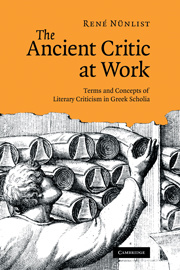Description
The Ancient Critic at Work
Terms and Concepts of Literary Criticism in Greek Scholia
Author: Nünlist René
This book shows the importance of the Greek scholia, the marginal and interlinear notes on manuscripts, for understanding ancient literary criticism.
Language: English
Subject for The Ancient Critic at Work:
Approximative price 63.71 €
In Print (Delivery period: 14 days).
Add to cart
The Ancient Critic at Work
Publication date: 08-2011
Support: Print on demand
Publication date: 08-2011
Support: Print on demand
Approximative price 122.57 €
Subject to availability at the publisher.
Add to cart
The ancient critic at work: terms and concepts of literary criticism in greek scholia
Publication date: 03-2009
458 p. · 16.1x23.5 cm
Publication date: 03-2009
458 p. · 16.1x23.5 cm
Description
/li>Contents
/li>
The large but underrated corpus of Greek scholia, the marginal and interlinear notes found in manuscripts, is a very important source for ancient literary criticism. The evidence of the scholia significantly adds to and enhances the picture that can be gained from studying the relevant treatises (such as Aristotle's Poetics): scholia also contain concepts that are not found in the treatises, and they are indicative of how the concepts are actually put to use in the progressive interpretation of texts. This book also demonstrates that it is vital to study both ancient terminology and the cases where a particular phenomenon is simply paraphrased. Nineteen thematic chapters provide a repertoire of the various terms and concepts of ancient literary criticism. The relevant witnesses are extensively quoted in Greek and English translation. A glossary of Greek terms (with translation) and several indices enable the book also to be used for reference.
Introduction; Part I: 1. Plot; 2. Time; 3. Narrative and speech; 4. Focalisation; 5. Effects on the reader; 6. Gaps and omissions; 7. Poetic licence; 8. Authentication; 9. Style; 10. Allusions, hints, hidden meanings; 11. Characters; 12. Mythography; Part II: 13. The gods in Homer; 14. Homeric similes; 15. Epithets; 16. Type scenes; 17. Homeric speeches; 18. Reverse order; 19. Staging, performance and dramaturgy; Epilogue; Glossary of Greek terms.
© 2024 LAVOISIER S.A.S.
These books may interest you

The Choephori of Aeschylus 38.06 €

Pindari opera quae supersunt 85.24 €

Pindari opera quae supersunt 68.81 €

